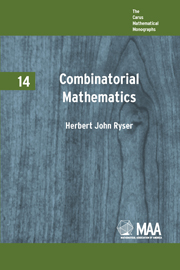Book contents
- Frontmatter
- Dedication
- PREFACE
- ACKNOWLEDGMENTS
- Contents
- CHAPTER 1 FUNDAMENTALS OF COMBINATORIAL MATHEMATICS
- CHAPTER 2 THE PRINCIPLE OF INCLUSION AND EXCLUSION
- CHAPTER 3 RECURRENCE RELATIONS
- CHAPTER 4 A THEOREM OF RAMSEY
- CHAPTER 5 SYSTEMS OF DISTINCT REPRESENTATIVES
- CHAPTER 6 MATRICES OF ZEROS AND ONES
- CHAPTER 7 ORTHOGONAL LATIN SQUARES
- CHAPTER 8 COMBINATORIAL DESIGNS
- CHAPTER 9 PERFECT DIFFERENCE SETS
- LIST OF NOTATION
- INDEX
PREFACE
- Frontmatter
- Dedication
- PREFACE
- ACKNOWLEDGMENTS
- Contents
- CHAPTER 1 FUNDAMENTALS OF COMBINATORIAL MATHEMATICS
- CHAPTER 2 THE PRINCIPLE OF INCLUSION AND EXCLUSION
- CHAPTER 3 RECURRENCE RELATIONS
- CHAPTER 4 A THEOREM OF RAMSEY
- CHAPTER 5 SYSTEMS OF DISTINCT REPRESENTATIVES
- CHAPTER 6 MATRICES OF ZEROS AND ONES
- CHAPTER 7 ORTHOGONAL LATIN SQUARES
- CHAPTER 8 COMBINATORIAL DESIGNS
- CHAPTER 9 PERFECT DIFFERENCE SETS
- LIST OF NOTATION
- INDEX
Summary
This monograph requires no prior knowledge of combinatorial mathematics. In Chapter 1 we deal with the elementary properties of sets and define permutation, combination, and binomial coefficient. Of course we treat these concepts from a mature point of view, and from the outset we assume an appreciation for the subtleties of mathematical reasoning. Combinatorial mathematics is best studied within the framework of modern algebra, and for this reason we presuppose a certain familiarity with a few algebraic concepts. Matrices are the really important tool. They occur throughout the monograph and unify the various chapters. At first they are primarily rectangular arrays and little is needed in the way of background. Later they play a fuller role, and we apply the standard rules of matric manipulation. Number theory is used sparingly. An understanding of integral congruences is adequate for most purposes. Groups and fields are mentioned in passing. Only on rare occasions do we call for something beyond the definitions of these systems.
Many of our proofs rely on counting arguments, finite induction, or some other time-tested device. But this does not mean that combinatorial mathematics is easy. The subject is demanding and its exposition is troublesome. Our definitions and proofs are concise and they deserve careful scrutiny. But effort and ingenuity lead to mastery, and our subject holds rich rewards for those who learn its secrets.
- Type
- Chapter
- Information
- Combinatorial Mathematics , pp. ix - xPublisher: Mathematical Association of AmericaPrint publication year: 1963



